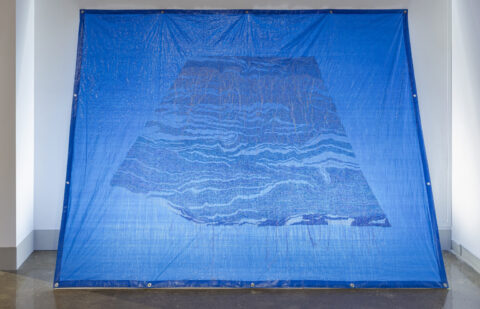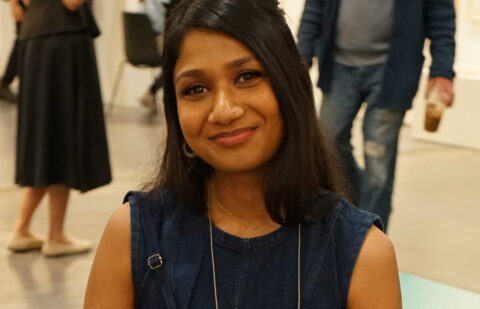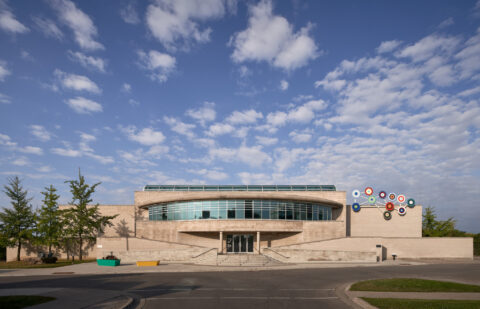Please join us in welcoming multidisciplinary artist Noah Scheinman to the RBC Emerging Artist Residency Program! During his residency at the RMG, Noah will continue his ongoing research into the social and environmental impacts of nuclear power in Canada and work towards a new exhibition of sculpture and audiovisual installation. To learn more about Noah’s artistic practice and his plans for the incubator lab, visit his profile and read his blog post below!
My name is Noah Scheinman, and I’m a multidisciplinary artist with a research-based practice that includes work in sculpture, installation, moving image, photography, and design. I have a tendency to pursue long, self-initiated, and multi-stage projects that use art and media as material and conceptual paradigms for investigating the complex and contested environments of the Anthropocene—how they are imagined, constructed, maintained, resisted, and ultimately fall into ruin. In this context, ruin doesn’t imply simply disappearance or decay, but rather indicates the enduring afterlives of (industrial) modernity as it continues to haunt contemporary and future landscapes through legacies of contamination, colonialism, and the commodification and instrumentalization of natural worlds. One of these projects, Timber Limits, explores the histories, epistemologies, and political ecologies of forests and the timber industry in so-called Canada (and its global reach), while in another I use speculative geo-fiction to consider lithographic narratives of concrete as it became the material and metaphorical basis for rapid postwar urbanization.
The work proposed for my residency at the RMG emerges from another ongoing research trajectory, The Legacy of Matter, which engages artistic methodologies to map Canada’s Postnuclear Landscape—the network of geographic sites which have been irrevocably transformed by the extraction, processing, transportation, use, and storage of atomic materials. What is called “clean energy” also produces a host of damaging socio-ecological externalities that have and will continue to impact human and more-than-human worlds for generations to come. This includes northern locations where uranium is mined, laboratories where nuclear technologies have been tested (sometimes in forests and ponds!), and communities where proposals for the long-term storage of radioactive waste have the potential to forever reshape the land and its relations. While research and travel to each individual site informs a video-essay and accompanying sculptural installation that unpacks the unique features of a local place, it is when these artworks/locations are considered together that connections are made that reveal larger systematic patterns of environmental violence. This is not the spectacular destruction of exploding bombs and reactor meltdowns, but rather (to borrow from the scholar Rob Nixon) the slow, incremental violence of difficult-to-perceive processes that do their work over extended periods of time.
In residence, I will continue this work by focusing on the particular historical conditions of Oshawa and the regional municipality of Durham as they relate to the production of nuclear energy, the shores of Lake Ontario, the increasing obsolescence of combustion engines, and questions of containment, exposure, and toxicity when ideologies and bodies clash and mingle in unruly mixtures of earth and time. This research program will be loosely organized around five thematic clusters:
1) Sound, geography, and jurisdiction
2) Energy regimes and material cultures
3) Invisible visibilities/visible invisibilities
4) Environmental histories of nuclear architectures
5) Radioactive water and the shoreline
Through these interconnected groupings I will investigate such events as the Gunshot Treaty of 1789, which established the northern boundary of British control in the area using the acoustic reach of a musket shot from the shoreline, the environmental implications (past, present, future) of locating nuclear generating stations in close proximity to Lake Ontario, and the ways the nuclear regime is simultaneously visible (material and architectural) and invisible (unseen radioactivity and secretive) and sometimes a weird hybrid/paradox of the two.
Informed by research and thinking on these topics, which also includes significant fieldwork, I intend to produce an audiovisual installation and pursue several lines of sculptural experimentation which poetically bring together a range of ideas and processes that address the symbols, spaces, and socio-natures of the region’s constantly changing environment… But more on that later. For now I wanted to sign off by expressing my gratitude for the opportunity to embed within the community of Oshawa and by inviting anyone with an interest in visual art, film, ecology, energy, infrastructure, fashion, rocks, baseball, and swimming to visit the RMG and drop by the incubator lab to chat about life and see what I’m working on. My project is not so much about being pro- or anti-nuclear, but rather motivated by a desire to reflect on the rich constellation of issues that attend this major development in the history of the earth. It is a challenge to myself and others to consider the nuclear regime beyond reductive and binary arguments of, for, or against, and instead focus on how it intersects with systems of power and the long-term health of the places where it materializes.


